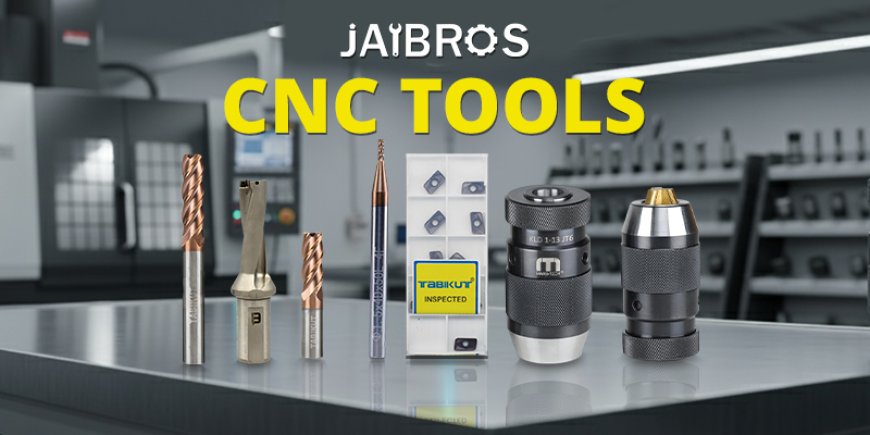Top CNC Tools Every Machinist Should Have – Expert Guide
Discover essential CNC tools every machinist needs for accuracy, efficiency, and smooth machining. Learn how to choose the right tools for better results.

How to Select the Best CNC Tools for Precision Machining
Precision machining is a key component of modern manufacturing in all industries, including aerospace, automotive, and medical. The performance of a CNC machine relies on the right tools; not only do the type of tool, shape, geometry, and materials of a tool significantly affect surface finish, speed, as well as wear and accuracy of the tool being used, but so do the right tools. This article outlines how to choose the best CNC tools for precision machining, particularly for the smaller diameter types like CNC tools and mills 3mm, while providing readers with reliable CNC tools manufacturers and online shops in India.
Key Types of CNC Tools Used in Precision Machining
Different manufacturing needs require specialized CNC cutting tools. Here are the most widely used ones:
-
End Mills – Used for profile milling, face milling, slotting, and contouring operations.
-
Drill Bits – Suitable for creating cylindrical holes with high depth-to-diameter ratios.
-
Reamers – Used to refine and improve hole precision after drilling.
-
Taps – Create internal threads on pre-drilled holes.
-
Turning Inserts – Applied in lathe-based CNC machines for shaping cylindrical surfaces.
-
Boring Bars – Ideal for enlarging pre-drilled or cast holes with high dimensional accuracy.
-
Ball Nose End Mills – Common in 3D contouring applications for smooth surface finishes.
Understanding the characteristics and applications of these CNC machining tools helps engineers and machinists choose the right one for every stage of the manufacturing process.
Factors to Consider When Choosing CNC Tools
Selecting the best CNC tools for precision machining is not a one-size-fits-all decision. Several factors influence tool performance, wear life, and overall process stability.
Material Compatibility
The most critical factor is the compatibility between the workpiece material and the tool material. Common categories of tool materials include:
-
High-Speed Steel (HSS) – Suitable for general-purpose machining of softer metals.
-
Carbide Tools – Excellent for hard materials like titanium, stainless steel, or alloys.
-
Ceramic and CBN Tools – Used for ultra-hard materials at high speeds.
-
Diamond Tools (PCD) – Preferred for non-ferrous metals, composites, and plastics.
For example, using carbide end mills for stainless steel ensures high wear resistance and superior precision.
Tool Geometry
Cutting-edge geometry directly affects the surface finish and chip removal. Choosing the right flute count, helix angle, and tool diameter is vital. Smaller tools, such as a CNC tool and mill 3mm, are perfect for intricate milling paths or micro-machining components in the electronics and medical industries.
Coating Technology
Advanced coatings improve tool life by reducing friction and increasing heat resistance. Common coatings include:
-
TiN (Titanium Nitride) – Reduces wear, suitable for general cutting.
-
TiAlN (Titanium Aluminum Nitride) – Ideal for high-speed applications.
-
DLC (Diamond-Like Carbon) – Excellent for non-ferrous materials and dry machining.
Choosing a coated tool can often double the life expectancy compared to uncoated versions, especially in continuous operations.
Machine Compatibility
Each CNC machine has speed and feed limitations. Choosing tools that align with the spindle power, speed range, and maximum cutting depth ensures optimal results. High-rigidity tools are better for machines with strong spindle setups, while lighter tools are ideal for smaller CNC systems.
Cutting Parameters
Every material and tool requires specific feed rates, cutting depths, and spindle speeds. The wrong parameters may cause tool chipping or thermal stress. Always follow the manufacturer’s recommended parameters when working with delicate milling tasks or micro-size end mills like 3mm variants.
The Importance of Quality in CNC Tools Manufacturing
Behind every efficient CNC operation lies a reliable CNC tool manufacturer. The best manufacturers follow stringent quality standards, such as ISO 9001 certification, and use automated inspection systems. They focus on dimensional accuracy, surface finish, and edge consistency.
Some of the world’s leading CNC tool makers integrate advanced technologies such as:
-
Precision grinding systems with automatic compensation
-
Laser inspection for measuring edge sharpness
-
Powder metallurgy processes for carbide tool creation
-
Cryogenic treatment to enhance tool hardness
In India, the CNC manufacturing industry has grown rapidly, offering a wide selection of locally made tools with global-level performance. Choosing a trusted Indian supplier can significantly reduce lead times and costs while supporting domestic production.
Buying CNC Tools Online in India
The convenience of purchasing from an online CNC tools shop in India has transformed how workshops and factories source their supplies. Today, many reputable manufacturers and distributors operate online platforms offering:
-
Wide tool catalogs with detailed specifications
-
Custom tool design requests
-
Competitive pricing and bulk order options
-
Real-time inventory tracking
-
Fast delivery to major industrial zones
Some online stores even provide technical consultation or virtual support to guide customers on selecting tools for specific materials or projects. Always ensure the supplier provides valid certification, material data sheets, and return policies before purchasing.
Precision Machining Techniques and Tool Selection Strategy
Precision machining is not only about selecting high-grade CNC tools but also about optimizing the entire machining strategy. Engineers often use digital simulation software to test tool paths before production. These software tools help predict wear rates, cutting forces, and cycle times.
When selecting CNC tools, consider a layered approach:
-
Roughing Tools for removing bulk material quickly.
-
Semi-Finishing Tools to improve dimensional accuracy.
-
Finishing Tools (such as ball-end mills or small-diameter cutters) for surface perfection.
For instance, a 3mm end mill is commonly used in the finishing stage to achieve tighter tolerances and smoother surfaces.
Maintenance and Care of CNC Tools
Even the best tools lose their edge without proper maintenance. Extend the lifespan and maintain precision with these practices:
-
Regular cleaning to remove chips and residue.
-
Proper tool storage to prevent corrosion.
-
Scheduled inspection for wear or micro-cracks.
-
Tool regrinding or re-sharpening, where applicable.
-
Using correct coolant systems to regulate temperature.
Following a preventive maintenance schedule minimizes downtime and ensures consistent machining output.
Future Trends in CNC Tool Technology
The CNC tools industry is evolving rapidly with automation, nanotechnology, and data-driven solutions. Some emerging trends include:
-
Smart Tools with embedded sensors that monitor temperature, vibration, and load.
-
Hybrid Materials combining ceramics and carbides for superior toughness.
-
Additive Manufacturing of Tools for faster prototyping and customization.
-
AI-powered Tool Path Optimization for real-time efficiency improvements.
These innovations redefine how manufacturers approach precision machining, making future CNC operations even faster, smarter, and more efficient.
Conclusion
Selecting the right CNC tools for precision machining is both a science and an art. It demands an understanding of materials, process dynamics, and machine capabilities. The ideal CNC tool offers superior durability, consistent quality, and compatibility with technological trends. Whether you purchase from a local CNC tools manufacturer or a CNC tools online shop in India, such as Jaibros, prioritize proven performance, precision engineering, and trusted support.































